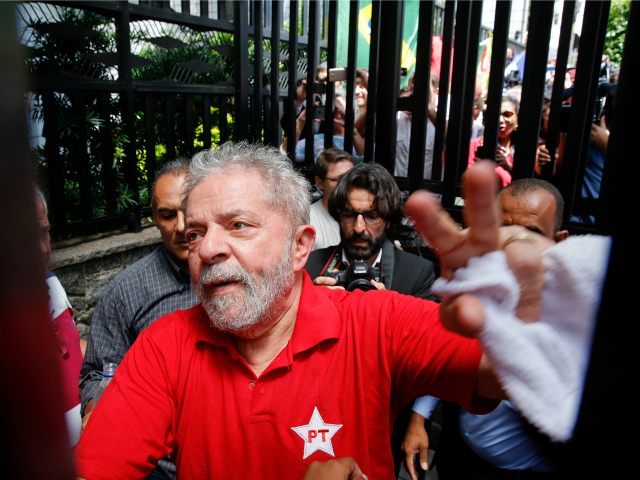Brazil’s government is expected to grant former president Luiz Inacio Lula da Silva a position as minister alongside President Dilma Rousseff, a move many suspect is intended to shield da Silva from facing money laundering charges in federal court.
Brazilian federal prosecutors are seeking a warrant for da Silva’s arrest after years of investigating an elaborate kickback scheme within the nation’s state oil corporation, Petrobras, revealed evidence that da Silva may have received some illegal funds while president — evidence leading to the alleged use of a luxury waterfront home to launder some of the money stolen out of Petrobras.
Becoming a minister in the federal government would prevent federal courts from charging da Silva. Judge Sergio Moro, in charge of the Petrobras investigation, is expected to accept prosecutorial demands to arrest the former head of state. He does not receive full immunity, however, and his case may see the light of day in the Supreme Court. Many suggest that Supreme Court judges would be less comfortable targeting a former president, regardless of the evidence, than a judge like Moro.
Accepting a position as minister, opponents say, would “be an admission of guilt.” Da Silva has denied any involvement in the corruption scheme. Brazil’s O Globo newspaper suggests that the public announcement of his appointment has been delayed due to developments in the Petrobras investigation — namely, a tape surfacing allegedly proving that Rousseff’s right-hand man Aloísio Mercadante attempted to pay Amaral not to implicate any high-level officials should police interrogate him. The newspaper suggests Rousseff will announce the appointment on Wednesday.
The investigation into Petrobras has been ongoing for years, following the revelation of evidence that indicated that officials at the corporation during da Silva’s tenure had systematically overcharged on corporate projects and kept the extra money. The New York Times estimates the amount of money stolen through that scheme at more than $3 million during the da Silva years. Both Rousseff, who served as da Silva’s Minister of Energy before assuming the presidency, and da Silva himself had escaped suspicion in this case until last week, when police detained da Silva for three hours to interrogate him on the testimony of legislator Delcídio Amaral, who indicated da Silva was involved in the mass theft. Rousseff and da Silva are both members of Brazil’s socialist Workers’ Party. The federal court has not given any indication it has evidence of Rousseff’s involvement in the scheme.
Da Silva dismissed the interrogation as a “media show” and has denied any wrongdoing. He has specifically denied owning the beachfront property in question: “The Federal Police invented the story about the triplex that’s a Homeric dirty trick.” The Wall Street Journal notes that, while Rousseff is not being investigated in relation to Petrobras, Brazil’s Congress is seeking to impeach her over public accounting inaccuracies during her tenure.
By subscribing, you agree to our terms of use & privacy policy. You will receive email marketing messages from Breitbart News Network to the email you provide. You may unsubscribe at any time.
Judge Moro deemed Amaral’s testimony official admissible in court on Wednesday, increasing the chances that he would order da Silva’s arrest. Amaral testimony followed his arrest after investigators found evidence of his role in the Petrobras scandal.
The potential theft of more than $3 billion from Brazil’s public coffers has triggered the largest protests in the nation’s history. On Sunday, an estimated 3.6 million Brazilians took to the streets, demanding that Rousseff resign from the presidency, calling for all Workers’ Party politicians to be ousted for their corruption. More than a million people congregated in Rio de Janeiro and Sao Paulo, and more than 100,000 stood by the doors of Congress in Brasilia.
Rousseff has responded to the protests by praising the Brazilian people, as there were no recorded incidents of violence during any of the rallies. “The peaceful nature of the demonstrations that took place on Sunday demonstrates the maturity of a country that knows how to live with divergent opinions and ensures respect for its laws and institutions,” she said in a statement. These protests are an escalation from the “panelaço” protests of 2015, in which Brazilians in major cities would choose a time to bang pots in unison, their noise a protest of the administration. The most recent panelaço occurred during Rousseff’s televised speech warning citizens to take precautions against unknowingly creating mosquito nests and exacerbating the nation’s Zika virus epidemic, which has affected more than one million people nationwide.

COMMENTS
Please let us know if you're having issues with commenting.